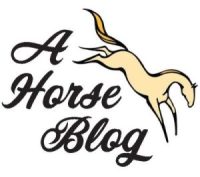Last Updated on April 22, 2024 by Teri Rehkopf
| DISCLOSURE: Some links in this article are affiliate links, meaning I receive a commission at no extra cost to you. Thank you for purchasing through us and for your support! Please read my DISCLOSURE STATEMENT for more info. |
I’ve always been into survival prepping, end-of-times, apocalypse planning and The Bomb. I grew up in the 50s during the Cold War and the nuclear bomb was scary . Our 30 acres was designed for self-sufficiency and to live off of the land. Yes, we worried about The (Atomic) Bomb.
An Original Survivalist
I get this desire to do survival prepping from both parents. I have almost always lived in the country. My mom raised and sold 10,000 chickens until she went bust on them in the late 40s. She and her husband at the time built a bungalow house out of pecky cypress. The house was built by a house raising – neighbors from 5 miles around came to help. Her parents (my grandparents) came down from Toledo to Florida to live with them. My mom grew up in Toledo.
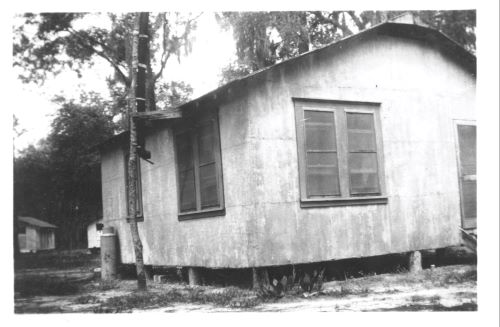
She (Faith Babcock at the time) was written about in the local Jacksonville, FL paper. She was an original survivalist. Her husband, J. Babcock, was a writer. He wasn’t very good at making things. They divorced a few years later.
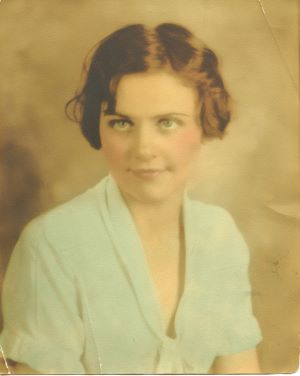
They slept under the stars and ate fish that jumped into their canoe. One evening it rained really hard so they pulled their canoe up the riverbank and went to a farm and asked if they could sleep in their barn.
Not done back then.
Nope!
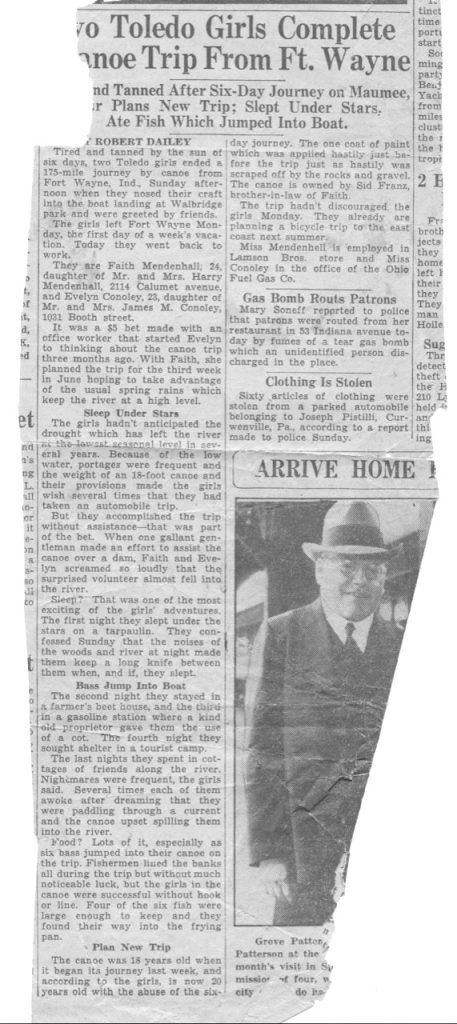
Artesian Well, a Pool, and Ducks!
We had an artesian well that came out of the pipe that would sting your tongue from the super strong pressure of the sulfur water pushing through the limestone aquifer. The well had enough pressure so that the water flowed constantly into our man-made pool and powered a constantly flowing water wheel that he also built out of pecky cypress. The pool drained into a small overflow pond that had a little cage for our ducks. The ducks also swam in the pool. They would drop their eggs in the pool. My brother and I had to dive in and get them. We would get a pass when it was winter — brrrrr!
It was great to always have water, even when the electricity was out. There was enough pressure so we could fill buckets, if necessary, although we used the pool for that, too. See the original post about the house/log cabin build here (opens in new tab so you won’t lose this post).
A Log Cabin from Our Pine Trees
My father built our log cabin home (see Building a Log Cabin, …) from the pine trees on our property. He felled and hauled each pine tree one by one up to where he was building the house. I was a baby when he started building the house so I’m not sure how he cleaned and cut each log and got them in place. I’m guessing some type of cantilevering was done.
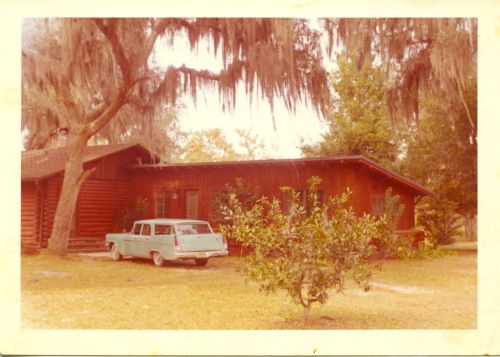
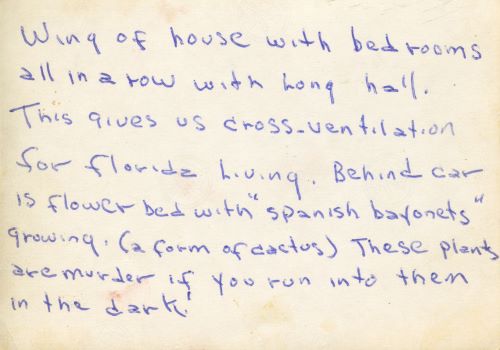
In the middle of the house was a large stone fireplace. We used the fireplace to heat until my father built an extension to the house for 3 bedrooms and bath. It was on a long hallway with big built-in storage closets. All bedrooms had built-in storage closets. My room even had 2 built-in dressers and a small enclosed vertical bookcase that had a drop-down bookcase door to use for writing.
Creature Comforts
We had a 200 gallon natural gas tank located about 100 feet from the house for safety. This lasted maybe 5-6 months per filling. We had a gas stove, and refrigerator up until the mid 80s when I got remarried and we needed a bigger fridge.

The house was heated via a big heating oil tank. The heat came from floor registers. I used to love getting dressed over them in the winter. Air conditioning came from a very large window unit that was actually built into the wall. It was strong enough to cool the whole house, even my 800 square foot bedroom that was at the far end of the house down 4 steps. My bedroom was built over a large 20×20 foot porch area. I had a wood stove and the fireplace was up the steps, just a few feet away.
The end of the world is never really the end of the world — at least not in fiction. After all, someone must survive to tell the tale.
Emily Temple
Books about The (Atomic) Bomb and Survival
Starting as a 13-year-old, I read a bunch of apocalypse novels, mostly of the nuclear type. Alas, Babylon by Pat Frank was maybe my first. After our house was built, we moved from the cypress-built bungalow into the log cabin. After my grandparents died a few years later, they turned the cypress bungalow into a rental house.
When I was a pre-teen, we had renters that were survival prepper types and read disaster and apocalypse books. They got me in to sci-fi and prepping. Apocalypse books come under the sci-fi listing. So did a lot of prepper books since they are considered disaster preparedness.
Here are Amazon links to Kindle versions of the older books I read. You can also get hardcover versions from these links. These are books from the 1950s to 1960s, listed by my favorites. I’ll post links to more recent books in upcoming survival posts.
Alas, Babylon by Pat Frank – When the unthinkable nightmare of nuclear holocaust ravaged the United States, it was instant death for tens of millions of people; for survivors, it was a nightmare of hunger, sickness, and brutality. Overnight, a thousand years of civilization were stripped away. One small Florida town survives, adapting to their new lives in a radioactive wasteland
Tomorrow! by Philip Wylie – A chilling what if? tale of nuclear apocalypse in the American heartland. Philip Wylie’s gripping parable Tomorrow! describes a time in America when doomsday threatens to dawn at any moment. A nation’s worst nightmare is made palpably real, seen through the eyes of a diverse group of ordinary citizens in two adjacent Great Plains metropolises.
Triumph (Beyond Armageddon) by Philip Wylie re-release in paperback only, December 1, 2007. In the world’s upper hemisphere, only one small group has survived World War III: fourteen people, sheltered deep within a limestone mountain in Connecticut and with enough supplies and equipment to maintain their subsistence for upwards of two years.
Sound familiar? I loved this book.
On the Beach by Nevil Shute – A worldwide nuclear war is launched by accident! A handful of survivors hope for a miracle. But they think they are doomed. How does a person live when he knows he is going to die? Some carry on as usual – a few destroy themselves in a last mad fling at life.
“The most important novel of the Atomic Age.” — Washington Post.
The Three Stigmata of Palmer Eldritch by Philip K. Dick – On Mars, the harsh climate could make any colonist turn to drugs to escape a dead-end existence. Especially when the drug is Can-D, which translates its users into the idyllic world of a Barbie-esque character named Perky Pat. When the mysterious Palmer Eldritch arrives with a new drug called Chew-Z, he offers a more addictive experience, one that might bring the user closer to God. But in a world where everyone is tripping, no promises can be taken at face value.
John Christopher’s 1956 No Blade of Grass is an extremely compelling page turner that portrays our moral traditions and social glue as being so fragile that they can be swept away in a day. Compassion, mercy, and even friendliness are not as hard-wired as we would hope, and they quickly dissolve when the urgency of survival forces us to view all other people as competitors.
No Blade of Grass features a common theme in post-apocalyptic fiction: nobody expects things to fall apart as quickly as they do. (Just started re-reading this. My son has a big paperback copy.)
First published in 1949, George R. Stewart’s award-winning Earth Abides is one of the most influential science-fiction novels of the twentieth century. It remains a fresh, provocative story of apocalyptic pandemic, societal collapse, and rebirth.
The cabin had always been a special retreat for Isherwood Williams, a haven from the demands of society. But one day while hiking, Ish was bitten by a rattlesnake, and the solitude he had so desired took on dire new significance.
I have a veritable resource library of articles about survival prepping, end-of-times living. I will share those as I write from them. Do you have any survival or disaster prep/recovery stories you would like to share in the Comments? Any questions? Please comment! Thanks 🙂
- Small but Mighty: Three-Rider German Team Commands Nations Cup at Aachen
- Encore & Family Welcome a Sweet Grulla Filly in the Pryor Mountains
- Update from Wild Horse Fire Brigade
- 65 Years Later, It’s Still the Gold Standard for Ethological Study! – ‘The Goodall Method’
- Report on Wild Horse Population Dynamics and Critique of BLM’s Appropriate Management Level
